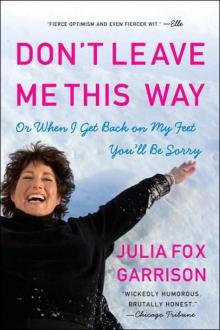Don't Leave Me This Way: Or When I Get Back on My Feet You'll Be Sorry 

Genre: Other5
Published: 2007
Series: New
View: 1978
Read OnlineRead Don't Leave Me This Way: Or When I Get Back on My Feet You'll Be Sorry Storyline:
Julia Fox Garrison refused to listen to the professionals she called Dr. Jerk and Dr. Panic, who—after she suffered a massive, debilitating stroke at age thirty-seven—told her she'd probably die, or to Nurse Doom, who ignored her emergency call button. Instead she heeded the advice of kind, gifted Dr. Neuro, who promised her he would "treat your mind as well as your body." Julia figured if she could somehow manage to get herself into a wheelchair, at least she'd always find parking. But after many, many months of hospitalization and rehab—with the help of family, friends, and her own indomitable spirit—Julia not only got into a wheelchair, but she got back out. Don't Leave Me This Way is the funny, inspiring, profoundly moving true story of a woman's fight for her life and dignity—and her determined quest to awaken an entrenched, unfeeling medical community to the fact that there's always a human being inside every patient. From Publishers WeeklyGarrison, a 37-year-old Boston-area woman with a great husband and a fine three-year old boy, was busy at work when she suddenly felt "a throbbing pain in the right side of her head... a volcano erupting inside her skull." The next thing she knew, her family was gathered around her hospital bed, and she couldn't feel the whole left side of her body. She'd had a massive brain hemorrhage and had only survived thanks to some very risky surgery. Doctors were divided about why she'd had this stroke; indeed, Garrison spent the next weeks and months fending off a dire diagnosis, vasculitis, from the pseudonymous "Dr. Jerk." Most of the professionals she dealt with were negative, wanting her to accept that she'd never walk again or have a full, satisfying life. But Garrison, with the help of her supportive husband, brothers, parents, friends and a few gifted therapists and doctors, managed an extraordinary recovery. By book's end, she is walking (albeit with difficulties), actively parenting again, trying to sue the makers of the cold syrup that triggered her stroke and giving motivational talks to doctors' groups. Her humorous, tear-jerking, struggle-to-recover-against-all-odds story is a lesson in finding silver linings. (June 13) Copyright © Reed Business Information, a division of Reed Elsevier Inc. All rights reserved. From BooklistAt 37, Garrison, then the mother of a three-year-old boy, suffered a massive cerebral hemorrhage that left her with a physically devastated body and more spiritual resolve than she'd ever had in her life. Armed with a sense of humor that has a real edge to it, she overcame obstacles that would have killed lesser spirits. From the outset, she also knew much more about what it takes to recover than her attending medical professionals, whom she dubs with such tags as Dr. Jerk, Dr. Bleak, and Nurse Doom--monikers that seem deserved for such behaviors as labeling her "in denial" because she refused to accept tacitly the prognostication of total paralysis for the rest of her life. Not medical care's prettiest face, to be sure. Unsatisfied by Dr. Jerk's diagnosis, which would have required a lifetime of chemotherapy, Garrison sought a second opinion. What she got, after the most superficial review of her case, was rubber stamping. But eventually she walked again. Inspirational is too weak a word to describe Garrison's memoir. Donna ChavezCopyright © American Library Association. All rights reservedPages of Don't Leave Me This Way: Or When I Get Back on My Feet You'll Be Sorry :